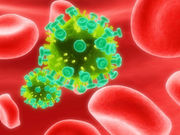Intrauterine transmission selects for infant variants with shorter, less-glycosylated V1 loops
TUESDAY, Feb. 21, 2017 (HealthDay News) — Specific HIV-1 variants are selected depending on the transmission route, according to a study published online Jan. 26 in Retrovirology.
Kyle J. Nakamura, Ph.D., from the David Geffen School of Medicine at the University of California in Los Angeles, and colleagues analyzed 647 full-length HIV-1 subtype C and G viral envelope sequences from 22 mother-infant pairs to examine the factors that influence variant selection.
The researchers identified unique genotypic and phenotypic signatures that vary with transmission route. Intrauterine HIV transmission selected infant variants with shorter, less-glycosylated V1 loops that were more resistant to soluble CD4 (sCD4) neutralization relative to maternal strains. Variants with fewer potential glycosylation sites in gp41, which were more sensitive to the neutralizing antibodies PG9 and PG16, and that bind sCD4 with reduced cooperativity were selected by transmission via breastfeeding. Regardless of transmission route, infant viruses required increased levels of surface CD4 receptor for productive infection, based on experiments with Affinofile cells.
“These data provide the first evidence for transmission route-specific selection of HIV-1 variants, potentially informing therapeutic strategies and vaccine designs that can be tailored to specific modes of vertical HIV transmission,” the authors write.
Copyright © 2017 HealthDay. All rights reserved.








